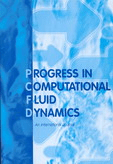
PROGRESS IN COMPUTATIONAL FLUID DYNAMICS
Scope & Guideline
Fostering Collaboration in Fluid Dynamics Research
Introduction
Aims and Scopes
- Advanced Numerical Methods:
The journal emphasizes the development and application of advanced numerical methods for solving fluid dynamics problems, including techniques like lattice Boltzmann methods, finite element methods, and spectral methods. - Multiphase Flow Dynamics:
Research on multiphase flow dynamics is a core area, focusing on the interactions between gases, liquids, and solids in various industrial and natural processes. - Heat Transfer and Thermal Dynamics:
The journal covers studies related to heat transfer mechanisms in different fluid systems, including nanofluids, phase change processes, and thermal management in engineering applications. - Aerodynamics and Turbomachinery:
A significant focus is placed on aerodynamics, particularly in the context of turbomachinery, airfoils, and energy systems, which includes optimization and performance analysis. - Environmental and Biological Applications:
The journal also explores environmental and biological applications of CFD, such as airflow in urban environments, medical applications in fluid dynamics, and the study of natural phenomena.
Trending and Emerging
- Integration of Machine Learning with CFD:
There is a growing trend towards integrating machine learning techniques with CFD to enhance predictive capabilities and optimize simulations, reflecting a broader shift towards data-driven methodologies. - Nanofluids and Advanced Materials:
Research involving nanofluids and their unique properties in heat transfer and flow dynamics is on the rise, showcasing the demand for innovative materials in engineering applications. - Complex Geometries and Flow Control:
An increasing number of studies are focusing on complex geometries and advanced flow control techniques, driven by the need for improved performance in engineering systems and applications. - Environmental Fluid Dynamics:
There is a notable uptick in research addressing environmental fluid dynamics, particularly the effects of urbanization and climate change on fluid flow patterns and heat distribution. - Biofluid Dynamics:
Research into biofluid dynamics, particularly in medical applications such as blood flow analysis and respiratory fluid dynamics, is gaining traction, highlighting the interdisciplinary nature of the field.
Declining or Waning
- Traditional Laminar Flow Studies:
There has been a noticeable decrease in studies focusing solely on traditional laminar flow dynamics, as the field shifts towards more complex turbulent and multiphase flow investigations. - Basic Fluid Dynamics Theory:
Research centered around foundational theories of fluid dynamics seems to be waning, with a shift towards applied and computational advancements that address real-world challenges. - Simplistic Heat Transfer Models:
Studies utilizing overly simplistic models for heat transfer analysis are becoming less frequent, as researchers increasingly seek more accurate and complex modeling techniques.
Similar Journals
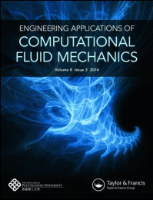
Engineering Applications of Computational Fluid Mechanics
Transforming Theory into Practice in Fluid MechanicsEngineering Applications of Computational Fluid Mechanics is an esteemed journal published by Taylor & Francis Ltd that serves as a vital resource for researchers, professionals, and students in the field of fluid mechanics and its computational applications. With an ISSN of 1994-2060 and an E-ISSN of 1997-003X, this journal has established its reputation through its rigorous peer-review process and commitment to Open Access since 2015, facilitating widespread dissemination of cutting-edge research. Based in the United Kingdom, the journal is indexed in leading databases and has achieved a significant impact in its categories, ranking in the top quartile (Q1) for both Computer Science (miscellaneous) and Modeling and Simulation as of 2023. Notably, its Scopus rankings place it in the top 4% of Mathematics/modeling and simulation, highlighting its importance in advancing knowledge and innovation within the discipline. The journal invites contributions that explore both theoretical and practical aspects of computational fluid dynamics, fostering collaboration and intellectual growth within the community.

MECCANICA
Fostering Collaboration in Cutting-edge ResearchMECCANICA, an esteemed journal published by Springer, stands at the forefront of research in the fields of Condensed Matter Physics, Mechanical Engineering, and Mechanics of Materials. Established in 1966 and continuing through 2024, this journal provides a robust platform for the dissemination of innovative research and advancements in these increasingly interconnected domains. With an impressive 2023 ranking placing it in the Q2 category across multiple fields, MECCANICA boasts a Scopus rank of #198 in Mechanical Engineering, #150 in Condensed Matter Physics, and #141 in Mechanics of Materials, highlighting its significance and influence within the scholarly community. The journal aims to foster dialogue among researchers, professionals, and students, facilitating the exchange of cutting-edge ideas and methodologies crucial for overcoming contemporary engineering and physics challenges. Readers can access a wealth of knowledge through its comprehensive articles, and while it does not currently offer open access, the journal remains instrumental in shaping the future of engineering and physical sciences.

Thermophysics and Aeromechanics
Pioneering Research at the Intersection of Science and EngineeringThermophysics and Aeromechanics, published by PLEIADES PUBLISHING INC, is an esteemed journal dedicated to advancing the fields of aerospace engineering, energy engineering, modeling and simulation, as well as nuclear and high energy physics. With an ISSN of 0869-8643 and E-ISSN 1531-8699, this journal serves as a vital platform for researchers and professionals working at the intersection of thermophysics and aeromechanics, delivering cutting-edge research, reviews, and case studies. Despite its current position in Quartile Q4 across multiple categories, including aerospace and energy engineering, it provides a unique opportunity for emerging ideas in these domains to gain visibility and impact. The journal's convergence of diverse scientific disciplines is critical for fostering innovation and technological advancements, making it an essential resource for students, practitioners, and academics alike. In this era of rapid scientific development, Thermophysics and Aeromechanics plays a pivotal role in disseminating knowledge and facilitating interdisciplinary collaboration among a global audience.
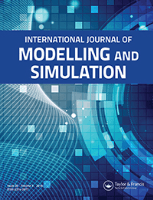
INTERNATIONAL JOURNAL OF MODELLING AND SIMULATION
Pioneering Insights in Engineering and Data AnalysisINTERNATIONAL JOURNAL OF MODELLING AND SIMULATION, published by Taylor & Francis Inc, stands as a leading platform for the dissemination of high-quality research in the fields of modeling and simulation across various engineering disciplines. With an ISSN of 0228-6203 and an E-ISSN of 1925-7082, this esteemed journal has been actively contributing to the academic community since 1996. It enjoys a commendable reputation, ranked in Q2 across numerous categories including Electrical and Electronic Engineering, Engineering (miscellaneous), and Modeling and Simulation, reflecting its vital presence in the academic landscape. The impact factor has not been specified, but its impressive Scopus rankings demonstrate its significance, particularly in General Mathematics and various engineering fields, placing it within the 83rd percentile and above. With a broad scope that encompasses industrial applications and theoretical advancements, the journal aims to foster innovations that drive progress in technology and data analysis. While it is a traditional subscription-based journal, researchers and practitioners are highly encouraged to submit their findings to contribute to the ongoing dialogue in this dynamic field, making it a valuable resource for both established experts and aspiring scholars.
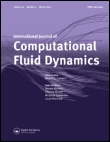
INTERNATIONAL JOURNAL OF COMPUTATIONAL FLUID DYNAMICS
Unleashing the Power of Computational Techniques in Fluid DynamicsInternational Journal of Computational Fluid Dynamics, published by Taylor & Francis Ltd, is a prominent academic journal dedicated to advancing the field of computational fluid dynamics (CFD). Since its establishment in 1993, the journal has provided a platform for disseminating high-quality research, covering a wide spectrum of topics across various engineering disciplines, including Aerospace Engineering, Computational Mechanics, and Mechanical Engineering. With an impact factor placing it within Q2 categories across several relevant fields, the journal holds a significant position in the academic community, evidenced by its diverse Scopus rankings. Researchers and practitioners engage with state-of-the-art methodologies and innovative applications presented within its pages, contributing to both theoretical development and practical solutions in fluid dynamics. Though it currently operates under a subscription model, the journal remains a vital resource for those seeking to deepen their understanding of computational techniques and their application in industries spanning engineering and physics. This makes it an essential read for professionals, researchers, and students alike, striving for excellence in this dynamic and evolving area of study.

INTERNATIONAL JOURNAL OF HEAT AND FLUID FLOW
Unlocking Insights in Fluid Dynamics and Thermal ProcessesFounded in 1979, the INTERNATIONAL JOURNAL OF HEAT AND FLUID FLOW is a premier publication in the fields of mechanical engineering, fluid dynamics, and heat transfer, published by Elsevier Science Inc. With an impressive impact factor and ranking in the Q1 category for Mechanical Engineering and Q2 for Condensed Matter Physics and Fluid Flow and Transfer Processes, this journal is highly regarded for its rigorous peer-reviewed articles that contribute significantly to the advancement of knowledge in these critical areas. Researchers, professionals, and students can access cutting-edge studies that explore the intricacies of thermal and fluid systems, ensuring they stay at the forefront of scientific exploration. The Scopus rankings further affirm its role as a leading source of impactful research, with significant placements in crucial academic categories. Join an active community of scholars committed to innovation and excellence in the exploration of heat and fluid flow phenomena.

Case Studies in Thermal Engineering
Elevating Knowledge in Thermal Engineering ExcellenceCase Studies in Thermal Engineering, published by ELSEVIER, stands as a premier platform for innovative research and analysis in the field of thermal engineering since its inception in 2013. With a robust Open Access model, this journal ensures that groundbreaking findings in fluid flow and transfer processes are readily accessible to a global audience, fostering collaboration and knowledge sharing across disciplines. Situated in the United Kingdom, the journal boasts an impressive impact factor, reflecting its status in the first quartile (Q1) for both engineering (miscellaneous) and fluid flow and transfer processes, as noted in the latest Scopus rankings. Researchers and professionals alike recognize its significance, ranking 9th out of 96 in Chemical Engineering and achieving a notable 91st percentile in its category. By publishing high-quality case studies, the journal aims to advance understanding and applications of thermal engineering principles, making it an essential resource for those looking to stay at the forefront of this dynamic field.
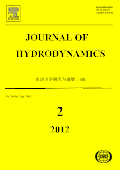
Journal of Hydrodynamics
Illuminating the Path of Hydrodynamic ResearchWelcome to the Journal of Hydrodynamics, a premier academic journal dedicated to pioneering research in the fields of Condensed Matter Physics, Mechanical Engineering, Mechanics of Materials, and Modeling and Simulation. Published by Springer, this esteemed journal has been a vital resource since its inception in 1990 and boasts a notable Q1 ranking across its relevant categories, underscoring its importance in advancing knowledge and innovation. With a robust Scopus ranking reflecting its impact—such as being in the 82nd percentile in Mathematics: Modeling and Simulation and the 75th percentile in various engineering disciplines—the journal serves as a critical platform for researchers, professionals, and students. While not currently an open-access publication, the Journal of Hydrodynamics remains committed to fostering scholarly dialogue and disseminating high-quality research that shapes the future of its field. Our mission is to provide a comprehensive forum for the discussion of theoretical and applied hydrodynamics, potentially influencing both academic inquiry and practical applications worldwide.

Archives of Thermodynamics
Pioneering Research in Thermodynamic SystemsArchives of Thermodynamics is a reputable journal dedicated to the field of thermodynamics, published by the esteemed POLISH ACADEMY OF SCIENCES. With a robust history since its inception in 2003, this journal serves as a critical platform for disseminating high-quality research aimed at advancing knowledge and technology in thermodynamic systems and processes. Recognized for its contribution to the field, it holds a Q3 ranking in the Physics and Astronomy (miscellaneous) category as of 2023, with a respectable Scopus rank of #148 out of 243, placing it within the 39th percentile. Although it follows a traditional access model, the journal's commitment to scholarly excellence ensures that researchers, professionals, and students alike can benefit from its rich archives and ongoing discussions within the scientific community. Situated in Warsaw, Poland, the journal not only reflects a regional dedication to scientific progress, but also engages with global audiences interested in the evolving landscape of thermodynamic research.

Advances in Aerodynamics
Pioneering the Future of Aerodynamics.Advances in Aerodynamics is a premier scholarly journal published by SPRINGERNATURE, dedicated to the innovative fields of Aerospace Engineering, Civil and Structural Engineering, Mechanical Engineering, and various aspects of Modeling and Simulation. Since its inception in 2019, this open-access journal has rapidly gained recognition, achieving a commendable Q1 ranking in several engineering categories as of 2023. With its compelling focus on pioneering research and advancements in aerodynamics, it serves as an essential platform for original research articles, reviews, and technical notes that address both theoretical frameworks and real-world applications in sustainable engineering practices. With an impact factor fostering its prominence and visibility in the academic community, the journal provides accessible content that fosters knowledge dissemination among researchers, industry professionals, and students alike. Situated in Singapore and with a commitment to rigorously peer-reviewed research, Advances in Aerodynamics is positioned to play a pivotal role in shaping the future of aerodynamics and its applications across various engineering disciplines.